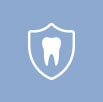Nightguards for Bruxism & TMJ Therapy
The Crux of Bruxism
 Some patients react to stress by grinding their teeth unconsciously during the day or, more commonly, while sleeping. The constant pressure and motion can harm teeth, as well as muscles and tissues in and around the jaw. The condition, known as bruxism, can be remedied with a nightguard.
Some patients react to stress by grinding their teeth unconsciously during the day or, more commonly, while sleeping. The constant pressure and motion can harm teeth, as well as muscles and tissues in and around the jaw. The condition, known as bruxism, can be remedied with a nightguard.
The Facts About Clenching & Grinding
Common symptoms of bruxism include a sore jaw, headaches, or earaches. Causes vary, but may include stress, anxiety, tension, misaligned teeth, posture, diet, sleeping habits, and other factors. Bruxism is most prevalent in women and generally found in about one-third of the population.
Constant clenching and grinding of the teeth can cause not only the aforementioned symptoms, but it may also contribute to TMJ (temporomandibular joint) dysfunction, which has a long list of side effects associated with pain in the head and neck. Teeth rubbing together consistently will result in surface wear over time, which will cause dental problems. Insomnia, eating disorders, and depression can result from bruxism if left untreated.
A Solid Solution
How can you stop an unconscious habit? A thorough evaluation will allow us to check your teeth, tissues, and muscles. If we determine that you suffer from bruxism, we'll create an orthodontic appliance, also called a nightguard or splint, to prevent grinding and clenching. Many types of nightguards exist, and patients react differently to the various styles. If one appliance does not work, another may. In many cases, simply wearing a nightguard will eliminate the problem.
TMJ Therapy
Managing Stress to Help Your Jaw Rest
 You may spend most of your life unaware of the important little triangular-shaped joints located in front of your ears. Lined with cartilage, these joints move with a smooth, gliding motion. Under normal conditions, they join your lower jaw and temporal bone, allowing your mouth to open and close easily. However, stress or an improper bite can cause the joints to dysfunction, exposing nerve endings to create pain. In fact, the temporomandibular joint is highly sensitive to overall physical, emotional, and psychological stress. It is affected by the mechanics of your bite and the condition of your jaw muscles. A little extra stress, a little extra fatigue, a little change in your bite, and you may temporarily knock the whole system out of balance. The resulting TMJ disorder, or TMD, can create a variety of mild to severe symptoms, from jaw clicking and minor discomfort to sharp pain in your temple, ear, neck, and shoulders.
You may spend most of your life unaware of the important little triangular-shaped joints located in front of your ears. Lined with cartilage, these joints move with a smooth, gliding motion. Under normal conditions, they join your lower jaw and temporal bone, allowing your mouth to open and close easily. However, stress or an improper bite can cause the joints to dysfunction, exposing nerve endings to create pain. In fact, the temporomandibular joint is highly sensitive to overall physical, emotional, and psychological stress. It is affected by the mechanics of your bite and the condition of your jaw muscles. A little extra stress, a little extra fatigue, a little change in your bite, and you may temporarily knock the whole system out of balance. The resulting TMJ disorder, or TMD, can create a variety of mild to severe symptoms, from jaw clicking and minor discomfort to sharp pain in your temple, ear, neck, and shoulders.
The condition is very common in our culture, so we evaluate patients for TMJ dysfunction at their regular dental exam. If we detect a problem, our goals are to arrest it, protect teeth from further damage, and correct underlying bite misalignment. Therapy may involve fitting you with a physiologic bite appliance, suggesting ways to alleviate stress, and recommending symptom relief measures. Typically, TMJ patients need to avoid chewing gum or hard, chewy food, take small bites, and alternate chewing between both sides of the mouth. Good nutrition will help the joint heal more quickly; good posture will also help relieve discomfort. A straight back and relaxed neck is also helpful. To relieve soreness, light temple and jaw massage will stimulate circulation and relax the muscles. If pain is present, we suggest alternating moist heat and cold for 20 minutes to further increase circulation. Over-the-counter anti-inflammatories or analgesics can be very helpful as well.
Call our Montgomery, TX dental office today to schedule your appointment with Dr. John R. Montgomery. Located near Lake Conroe, Montgomery Dental Center serves patients from Montgomery, Conroe, Willis, Magnolia, and surrounding areas with customized dentistry for smiles that last a lifetime.
Ask Dr. Montgomery

Implants

Veneers

Crowns & Bridges

